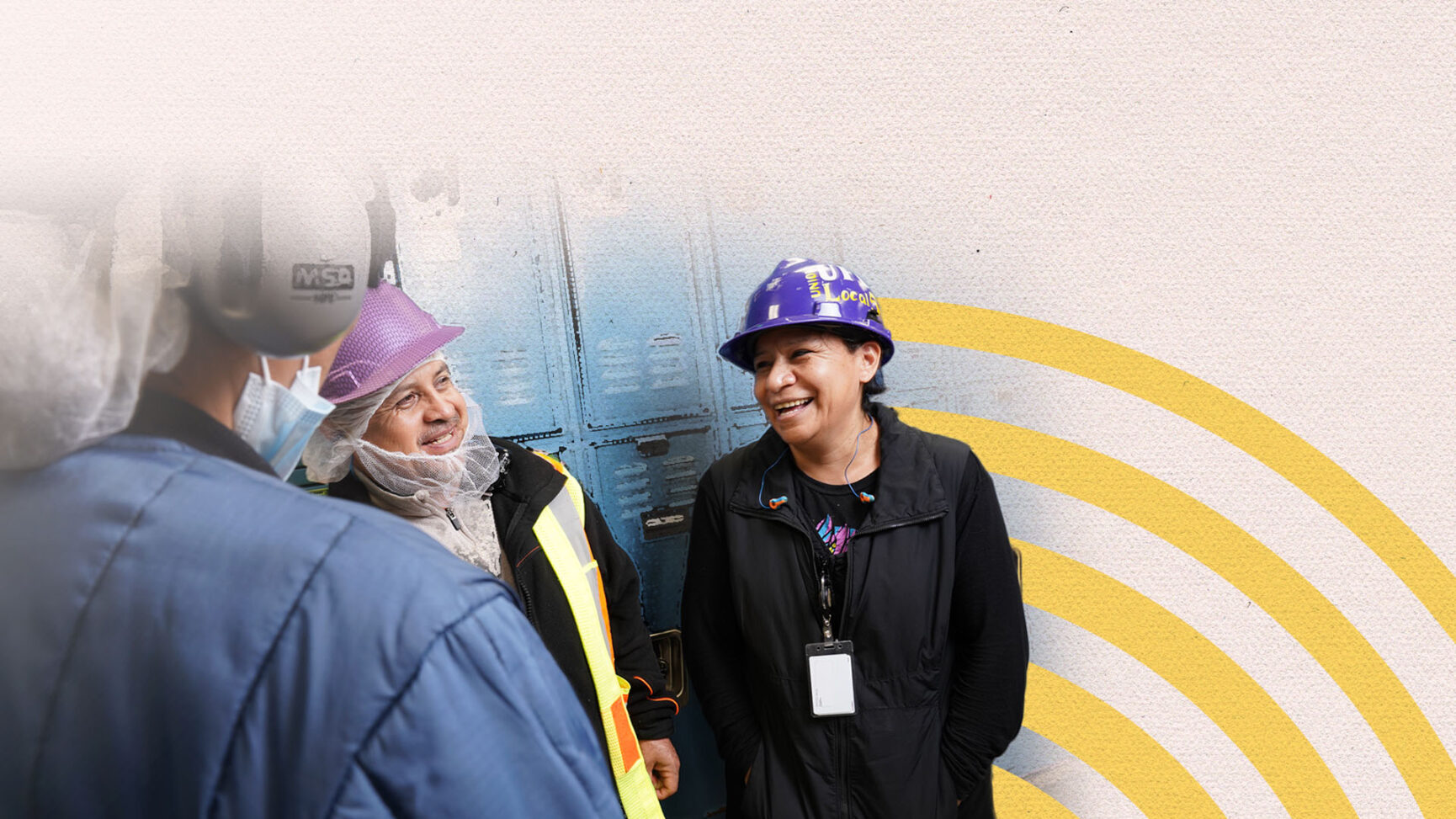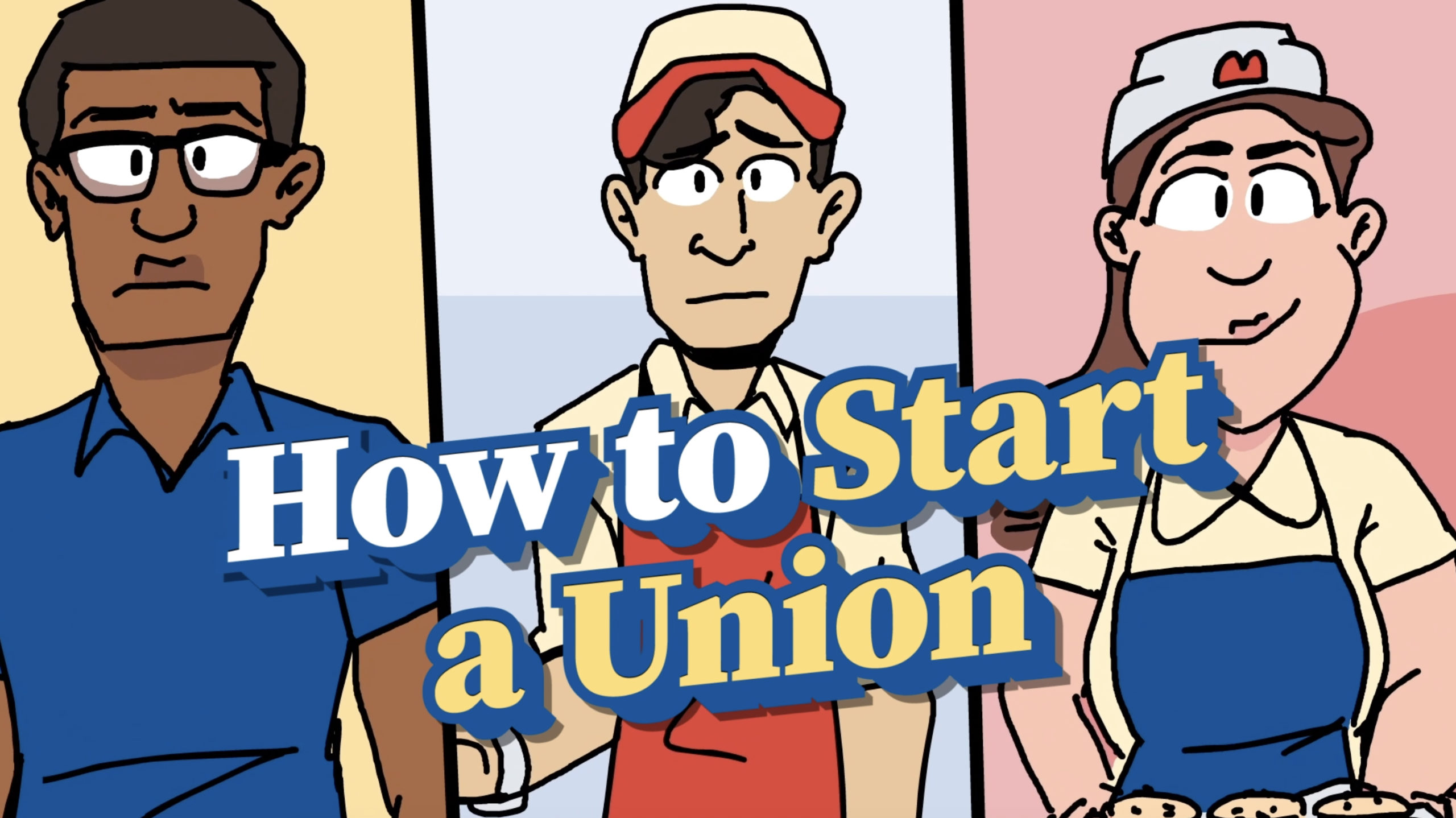A union is all about finding your voice.
The core of what makes up your labor union is the bonds between you and your coworkers — the more connected we are, the more we care about each other at and outside of work. That bond gives us the inspiration to join together to fight for better wages and working conditions.
Develop these bonds across your workplace, and you’ll have no problem with the formal process to be recognized by your employer: filing for and winning your union election.
To win that union election, you need to develop these bonds across your workplace. That means talking to as many of your coworkers as you can, to make sure you have the support you need to win. We recommend starting that process with the assistance of a union organizer and what we call “Workplace Mapping.”
Whether your company staffs 20 people or 2,000, this process takes time, work, and constant communication. This is, after all, why we typically refer to the process of starting a union as organizing.
We’re here to provide the resources you need to make this process go as smoothly as possible. In this section, we’ll break down the nuts and bolts of how labor organizing and union elections work, and what we’ve learned about running winning union campaigns.
What does it mean to organize?
A union is when workers join together and use their collective voice to make work better. This starts by talking to your coworkers about wages, benefits, and working conditions to find what they’d like to see protected and what they’d like to see changed.
No matter your questions, we’re here to provide answers and support you. From learning how you can start a union to better understanding all the steps involved in negotiating a contract, we want you to have all the information you need.
With the help of a Union Organizer, you will recruit a team of committed coworkers who want to build your union together, otherwise known as an organizing committee. Your committee should be a diverse group of leaders who represent all the different shifts, departments, and backgrounds at your workplace. Your committee will drive the organizing at your facility by having conversations with all your coworkers about both the process of starting a union and what changes they want to see at work.
The majority of companies would rather keep that control for themselves, so they often try to discourage employees from unionizing. But don’t worry: it is your right, protected by federal labor law, to start a union. You have the right to talk to your coworkers about starting a union and about workplace conditions, including pay.
Once you’ve confirmed that a majority of your coworkers agree that you all need a union, you will sign support cards. These cards tell your employer that you want to start a union and to have the UFCW as your partner at work to help negotiate better wages, benefits, and working conditions.
After you get a strong majority of your coworkers to sign these cards — we recommend 70% of your coworkers or more — you can submit them to the Labor Board and request a union election. You’ll work with the Board to settle the terms of your election with your employer, and once you win your election, you will gain the power to negotiate your first union contract.
Then it’s time to get the benefits you deserve. UFCW and our negotiating team, along with a bargaining committee comprised of workers ideally from every department and shift, will begin working on your first union contract.
You and your coworkers will have the opportunity to vote on the contract before it is finalized to ensure it has the benefits and value you deserve. After you’ve won your first contract, you can officially obtain UFCW membership!
Learn more about the steps of starting a union.
How do I talk to my coworkers about unions?
If you’re having issues at work, you’re likely not the only one.
The first step in unionizing is to get on the same page with your coworkers about their workplace issues and how these concerns impact their lives both at and outside of work. In our union campaigns, we’ve learned tried and true methods to help this process feel natural.
For example: unless you really know and trust someone, it’s never a good idea to lead with, “I’m thinking about starting a union here.”
Instead, start by asking questions based on how well you know somebody. If you don’t know them, get to know them. If you’re more comfortable with someone, find ways to ask them about issues they might be having: Are they getting enough hours? Are they happy with their pay? Do they feel safe at work? If they enjoy their job, don’t try to prod them about what they don’t like about it — instead, ask them what their favorite thing is about work. Because those are the things that you’ll want to secure in a contract.
Your union will be built on these individual relationships you and your coworkers have with one another, so that is where you should start – with the people in your department or on your shift.
Once you have a solid working relationship, you can get their contact info to follow up outside of work. A big anti-union talking point is that unions are divisive. This couldn’t be further from the truth!
You and your coworkers are the union, coming together to build relationships with one another and build better lives for everyone.
Naturally, starting these conversations can be a little intimidating! Especially since employers have spent decades discouraging workers from talking about things like pay, hours and so on — which often comes from a desire to keep control of your workplace in their hands. But we’re here to help! Make a plan with a union organizer and learn more about best ways to approach these topics here.
Frequently Asked Questions
Do I have the right to unionize?
Per the National Labor Relations Act, nearly every worker in the U.S. is able to unionize as long as they do not have supervisory roles in their position (such as the ability to hire and fire). There are also other exceptions to the NLRA, such as independent contractors, agricultural workers, and public sector employees. But even if you’re not covered by the NLRA, you should research relevant labor laws for the state you work in.
Thanks to the NLRA, workers’ rights to organize, to join a union, and to improve your working conditions together are protected. It is illegal for your employer to prevent you by threatening, interrogating, or spying on pro-union employees, or by promising benefits in exchange for you stopping your organizing efforts.
Think your rights have been violated or just have more questions on what’s protected? Let us know here!
How do I find a union organizer?
You’re in the right place! Our organizers are here to answer all of your questions and help you get started. You can get in contact with a union organizer by checking out our Start a Union page and filling out the form.
Can an employer stop me from starting a union?
It’s against the law for companies to interfere with your organizing campaign or to retaliate against you for organize. Federal law prohibits companies from making threats, interrogating, or spying on pro-union employees.
But sometimes, companies will still break the law during union campaigns, which is why it’s important to have the support of a trained union organizer when you start this process. The best way to protect your organizing from management interference is to keep it discreet.
How do union elections work?
After you reach a supermajority of support amongst your coworkers (we recommend at least 70% of your workplace) who have filled out union support cards, you file those cards with the National Labor Relations Board to demonstrate your interest in a union election.
Shortly after you file, you and your employer will negotiate a Stipulated Election Agreement with your employer and the NLRB that spells out the time, location, and method of voting (in-person or by mail), usually a few weeks after you file.
How many people do we need to start a union?
In most cases, when you and your coworkers vote on whether you want a union at work, you’ll need a majority of yes votes. For example, if there are 100 people at your company, 51 people must vote yes to win.
But in this situation, we always say the more the merrier! The strength of a union rests in its people. The more workers who come together, the more power they have. That’s why you should strive to talk to your entire workplace before your union goes to a vote – to make sure everyone’s concerns are heard and addressed. The best union contracts are negotiated when everyone works together under common goals and utilizes the leverage that their collective voice gives them.
Unionize Your Workplace
Are you and your coworkers ready to negotiate for bigger raises, stronger benefits, and better lives? If so, the steps to start a union with UFCW are simple.



